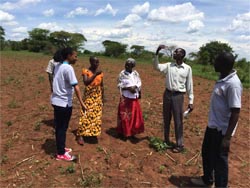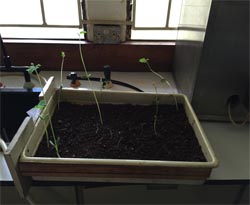In northern Uganda, N2Africa dissemination efforts through demonstrations, adaptations, media events and field days, amongst others, have created demand for grain legume technologies, especially improved soyabean varieties. However, there is a challenge to access the improved varieties from the formal seed systems, because they hardly deal in grain legume seed. N2Africa has a key objective of enhancing input access and supply to smallholders and embarked building capacity of communities to produce and market quality declared seed (QDS) through the Local Seed Business model (LSB). The LSB model provides management practices on seed health and crop diversification, an introduction of improved and tolerant varieties and opportunities for market integration and is championed by Integrated Seed Sector Development (ISSD) (see previous article).
Local seed businesses (LSBs) have been sought, as they fill the gap in quality seed production for especially grain legumes, in which the commercial seed companies show less interest. In many cases, LSBs start from the informal sector as farmer groups or entrepreneurial farmers, who see business opportunities in the production and marketing of quality seed and who are technically equipped, professionally organized, market oriented and strategically linked to achieve commercial sustainability. In our partnerships with World Vision Uganda and ISSD, we sought to improve seed access with some local seed businesses in northern Uganda now functional producing quality declared seed. In this region, the soyabean seed production meets the created demand through various farmer groups and cooperatives producing soya grain for sale.
Earlier this season (2016A), demand estimates of up to 40 tonnes for improved soyabean varieties (Maksoy 2N and 3N) were received from Apac, Kole and Oyam. Furthermore, N2Africa took the initiative to link the cooperatives with one local seed business in Pader, who provided seed with a quality certificate issued by the Ministry of Agriculture, Animal industries and Fisheries. On this basis, N2Africa placed an order of 2 tonnes of Maksoy 3N seed, on behalf of Aboke Grain Producer Cooperative (Kole district), Oyam Agro Cooperatives (Oyam district) and Bedi Gen Women group (Apac district).
There was a positive response from farmers whereby, in two weeks time, Bedigen Womens’ group had sold 425 kg out of 500 kg supplied, Oyam Agro Cooperative had sold 350 kg out of 500 kg supplied, while Aboke Grain producers had sold 300 kg out of 1,000 kg supplied. However, during the season, the cooperatives and group started receiving complaints of no / poor seed germination. This was already a loss of over 5 million Uganda shilling. The poor seed germination caused a backlash for the cooperatives and group, as well as N2Africa and it prompted N2Africa to conduct field verification visits and meetings with the different farming communities that had accessed the seed.
|
From the visits, it was evident that there was poor or no germination in all the fields that were visited (Figure 1) and efforts to calm the communities were made through meetings. N2Africa took samples to analyse the germination rate. The results showed that a germination rate of only 10% was obtained, which strongly contrasts with the certification results of 82% (Figure 2). This has been a drawback and this season efforts of ensuring that farmers buy good quality seed has been hampered. We may only suspect that LSB supplied expired soyabean seed (older than 6 months). Clearly, it demonstrates the need for quality assurance and honesty in business. From the visits, it was evident that there was poor or no germination in all the fields that were visited (Figure 1) and efforts to calm the communities were made through meetings. N2Africa took samples to analyse the germination rate. The results showed that a germination rate of only 10% was obtained, which strongly contrasts with the certification results of 82% (Figure 2). This has been a drawback and this season efforts of ensuring that farmers buy good quality seed has been hampered. We may only suspect that LSB supplied expired soyabean seed (older than 6 months). Clearly, it demonstrates the need for quality assurance and honesty in business. Our next steps are to discuss issues related to quality assurance and a trustworthy seed supply with LSBs and ISSD. Furthermore, we will devise strategies to have all the quality steps followed by the local seed businesses, to compensate the farmers, to strengthen business relations and to obtain guarantee commitments. |
Figure 1 and 2: Discussing the poor seed germination rate at the field of Mrs Dorcus and germination verification tests at the Makerere University, Uganda. |
Connetie Ayesiga


